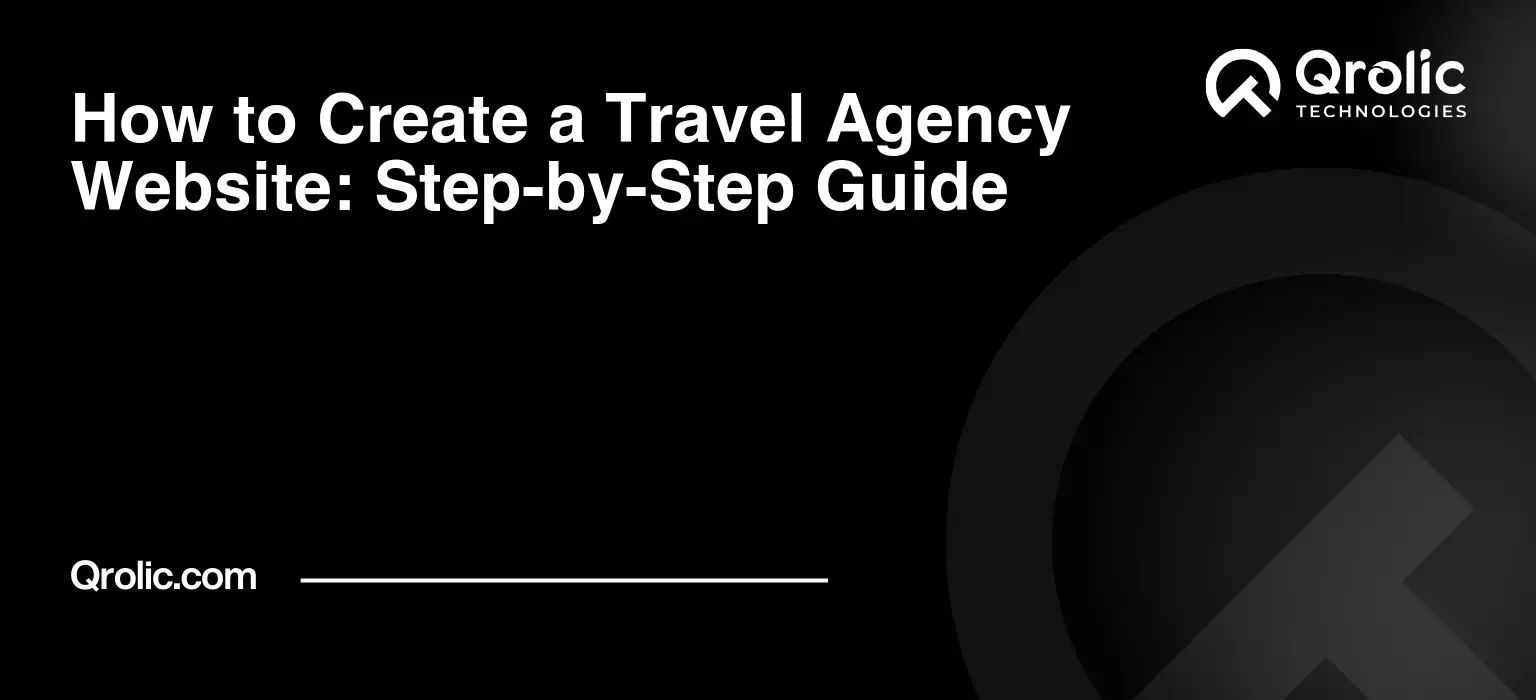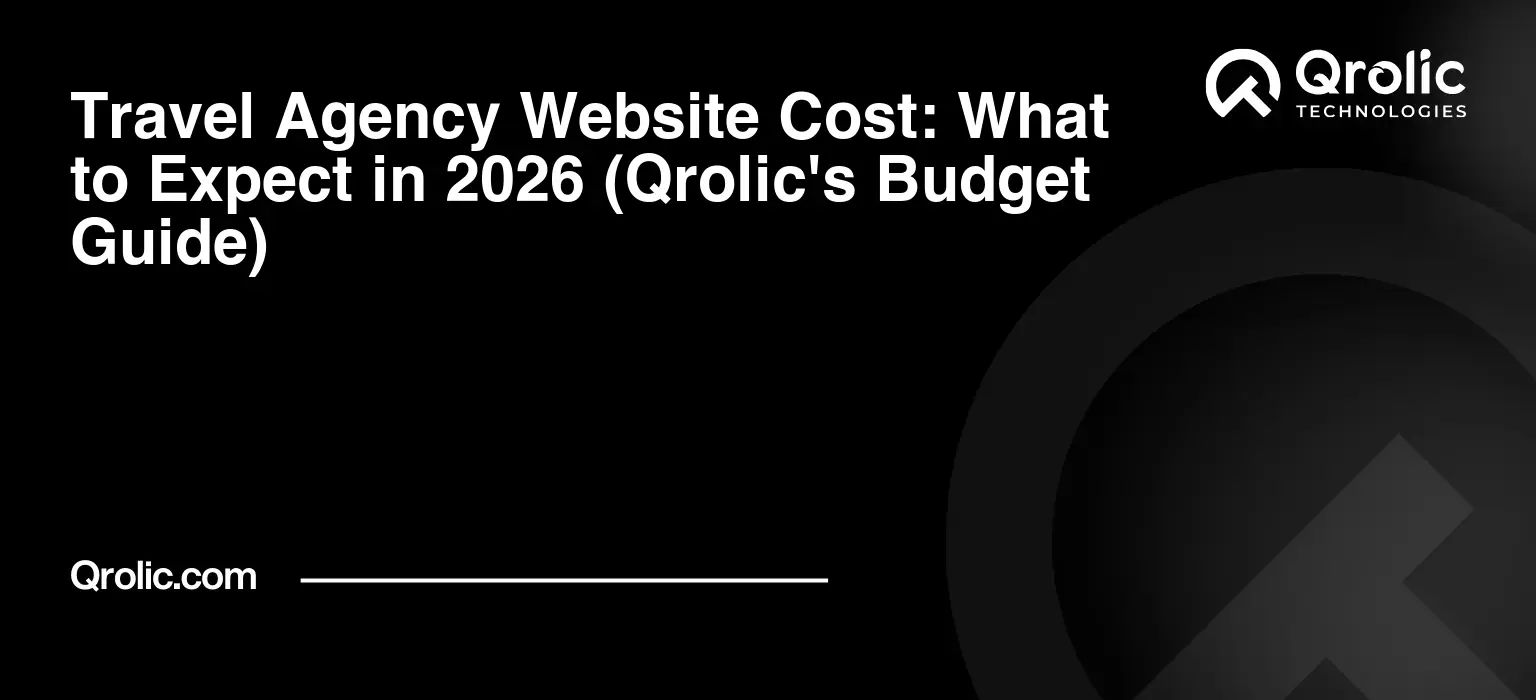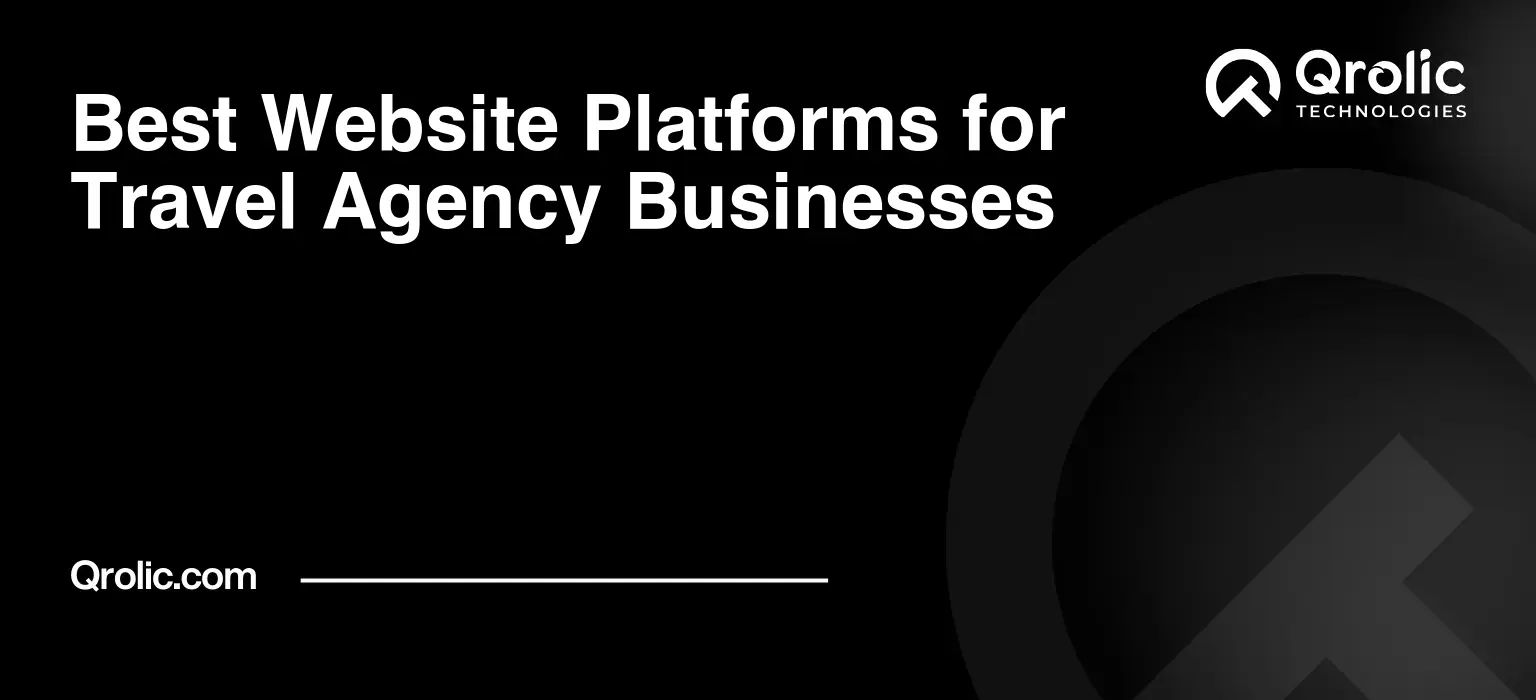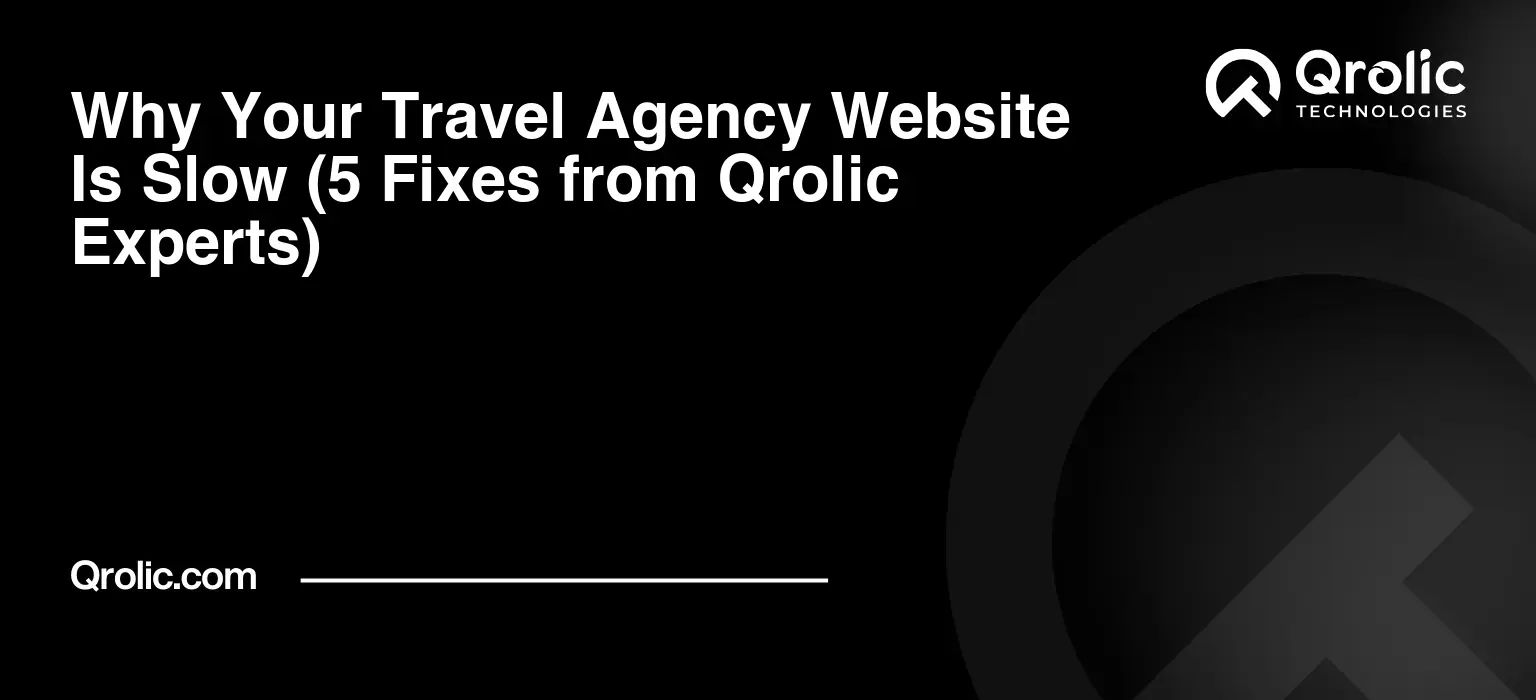Quick Summary:
- Your website is your essential digital travel storefront.
- Plan your site by defining audience, goals, and keywords.
- Build with engaging content, booking tools, and mobile design.
- Optimize for search engines, then launch and update regularly.
Table of Contents
- Why Your Travel Agency Needs a Killer Website (And Why Now!)
- Beyond the Brochure: The Website as a Travel Expert
- The ROI of a Well-Designed Travel Agency Website
- Step 1: Planning Your Travel Agency Website – Laying the Foundation
- Defining Your Target Audience: Who Are You Trying to Reach?
- Identifying Your Key Objectives: What Do You Want Your Website to Achieve?
- Conducting Keyword Research: Finding the Right Words to Attract the Right People
- Sitemap and Content Planning: Structuring Your Website for Success
- Step 2: Choosing the Right Platform and Design
- Website Builders vs. Content Management Systems (CMS): Which is Right for You?
- Selecting a Domain Name and Hosting Provider: Your Digital Address and Home
- Choosing a Travel Agency Website Theme: Design Inspiration
- Designing for User Experience (UX): Making Your Website a Pleasure to Use
- Step 3: Building Your Travel Agency Website – Content Creation and Functionality
- Crafting Compelling Content: Telling Your Travel Story
- Integrating Booking Engines and Payment Gateways: Making it Easy to Book and Pay
- Adding Essential Plugins and Functionality: Enhancing Your Website’s Capabilities
- Mobile Optimization: Catering to On-the-Go Travelers
- Step 4: Optimizing Your Travel Agency Website for Search Engines (SEO)
- On-Page SEO: Optimizing Your Website’s Content and Structure
- Off-Page SEO: Building Authority and Backlinks
- Local SEO: Attracting Local Clients
- Tracking Your SEO Progress: Measuring Your Success
- Step 5: Launching and Maintaining Your Travel Agency Website
- Testing Your Website: Ensuring Everything Works Flawlessly
- Promoting Your Website: Getting the Word Out
- Regularly Updating Your Website: Keeping it Fresh and Relevant
- Monitoring Your Website’s Performance: Identifying Areas for Improvement
- Qrolic Technologies: Your Partner in Travel Website Development
- Final Thoughts: The Journey Never Ends
Why Your Travel Agency Needs a Killer Website (And Why Now!)

In the age of instant information and wanderlust-inducing Instagram feeds, your travel agency’s website is no longer optional – it’s your digital storefront, your 24/7 travel advisor, and your most valuable marketing asset. Forget dusty brochures and relying solely on word-of-mouth. A compelling website is the key to attracting new clients, showcasing your expertise, and turning travel dreams into booked itineraries.
Beyond the Brochure: The Website as a Travel Expert
Think of your website as a dynamic, interactive brochure – one that never runs out of copies and can be updated instantly. It’s more than just pretty pictures; it’s a powerful tool to:
- Establish Credibility: A professional website instantly builds trust and confidence. Potential clients are far more likely to book with an agency that presents itself as legitimate and knowledgeable.
- Showcase Your Expertise: Highlight your niche specializations – adventure travel, luxury cruises, family vacations, destination weddings. Let your passion shine through!
- Attract New Clients: Optimize your website for search engines (more on that later!) to capture organic traffic from people actively searching for travel solutions.
- Provide 24/7 Service: Answer frequently asked questions, offer instant quotes, and allow clients to browse and book at their convenience.
- Boost Brand Awareness: Reinforce your brand identity with consistent visuals, messaging, and a memorable user experience.
- Generate Leads: Capture contact information through forms, newsletter sign-ups, and special offers to nurture potential clients.
- Increase Bookings: Streamline the booking process with integrated booking engines and secure payment gateways.
- Reduce Customer Service Load: Provide comprehensive information on your website to answer common inquiries and reduce the burden on your support team.
The ROI of a Well-Designed Travel Agency Website
Investing in a well-designed and optimized website is an investment in the future of your travel agency. Here’s how it translates into tangible results:
- Increased Revenue: More bookings, higher average transaction values, and repeat business.
- Reduced Marketing Costs: Less reliance on expensive traditional advertising.
- Improved Customer Satisfaction: A seamless online experience leads to happier clients.
- Competitive Advantage: Stand out from the competition with a modern, user-friendly website.
- Enhanced Efficiency: Automate tasks and streamline processes, freeing up your time to focus on client relationships.
Step 1: Planning Your Travel Agency Website – Laying the Foundation
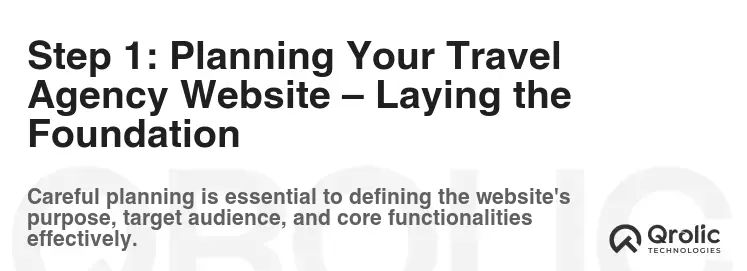
Before diving into design and development, take the time to carefully plan your website. This crucial step will ensure that your website meets your business goals and effectively serves your target audience.
Defining Your Target Audience: Who Are You Trying to Reach?
Understanding your ideal client is paramount. Consider the following:
- Demographics: Age, income, location, education level.
- Interests: Types of travel experiences they seek (adventure, relaxation, cultural immersion).
- Travel Style: Budget-conscious, luxury traveler, solo traveler, family traveler.
- Pain Points: What challenges do they face when planning travel? What are their biggest concerns?
- Online Behavior: Where do they spend their time online? What websites do they visit? What keywords do they use when searching for travel information?
Creating detailed “buyer personas” – fictional representations of your ideal clients – can be incredibly helpful. This will inform your website’s design, content, and marketing strategy.
Example Buyer Persona:
- Name: Sarah Miller
- Age: 35
- Occupation: Marketing Manager
- Location: Chicago, IL
- Travel Style: Adventure travel, sustainable tourism, cultural experiences.
- Pain Points: Lack of time to plan, difficulty finding authentic experiences, concern about the environmental impact of travel.
- Goals: To explore new cultures, challenge herself physically, and travel responsibly.
Identifying Your Key Objectives: What Do You Want Your Website to Achieve?
What do you want visitors to do when they land on your website? Common objectives include:
- Generate Leads: Collect email addresses for future marketing efforts.
- Drive Bookings: Enable online booking for tours, packages, and accommodations.
- Increase Brand Awareness: Establish your agency as a trusted authority in the travel industry.
- Provide Information: Answer frequently asked questions and educate potential clients about your services.
- Promote Special Offers: Highlight limited-time deals and seasonal promotions.
Prioritize your objectives and ensure that your website’s design and content support them.
Conducting Keyword Research: Finding the Right Words to Attract the Right People
Keyword research is the process of identifying the terms and phrases that your target audience uses when searching for travel information online. This is crucial for optimizing your website for search engines and attracting organic traffic.
Tools for Keyword Research:
- Google Keyword Planner: A free tool from Google that provides keyword suggestions, search volume data, and competition analysis.
- SEMrush: A comprehensive SEO tool that offers a wide range of features, including keyword research, competitor analysis, and site auditing.
- Ahrefs: Another popular SEO tool with powerful keyword research capabilities.
- Moz Keyword Explorer: A user-friendly keyword research tool with a focus on long-tail keywords.
Types of Keywords:
- Broad Keywords: General terms like “travel agency,” “vacation packages,” or “flights to Europe.”
- Long-Tail Keywords: More specific phrases like “best family vacation packages in Italy,” “affordable honeymoon destinations in the Caribbean,” or “adventure tours in Costa Rica for beginners.”
Focus on long-tail keywords, as they tend to have less competition and attract more qualified leads.
Integrating Keywords into Your Website:
- Page Titles: Include relevant keywords in the title of each page.
- Meta Descriptions: Write compelling meta descriptions that include your target keywords.
- Headings: Use keywords in your headings (H1, H2, H3, etc.).
- Body Text: Naturally incorporate keywords into your website’s content.
- Image Alt Text: Describe your images using relevant keywords.
- URLs: Create search engine friendly URLs containing relevant keywords.
Sitemap and Content Planning: Structuring Your Website for Success
A sitemap is a visual representation of your website’s structure. It helps you organize your content and ensures that visitors can easily find what they’re looking for.
Essential Pages for a Travel Agency Website:
- Homepage: Your website’s front door. Make a strong first impression with compelling visuals, clear messaging, and a clear call to action.
- About Us: Tell your agency’s story, highlight your expertise, and build trust with potential clients.
- Services: Describe the types of travel services you offer (e.g., vacation packages, cruises, flights, hotels, tours).
- Destinations: Showcase the destinations you specialize in, with captivating images and detailed information.
- Blog: Share travel tips, destination guides, and inspiring stories to attract new clients and establish your authority.
- Testimonials: Feature positive reviews from satisfied clients to build credibility.
- Contact Us: Provide your contact information and a contact form for inquiries.
- FAQ: Answer frequently asked questions to address common concerns and reduce customer service inquiries.
- Booking/Request a Quote: A dedicated page for initiating the booking process or requesting a personalized quote.
- Privacy Policy and Terms of Service: Essential legal pages to protect your business and your clients’ data.
Content is King (and Queen!):
Once you have your sitemap, plan the content for each page. Write compelling, informative, and engaging content that is optimized for search engines and tailored to your target audience. Use high-quality images and videos to enhance the user experience.
Ready to Build Your Next Project?
Let’s turn your ideas into a powerful digital solution. Contact us today to get started with expert web development and design services.
Step 2: Choosing the Right Platform and Design
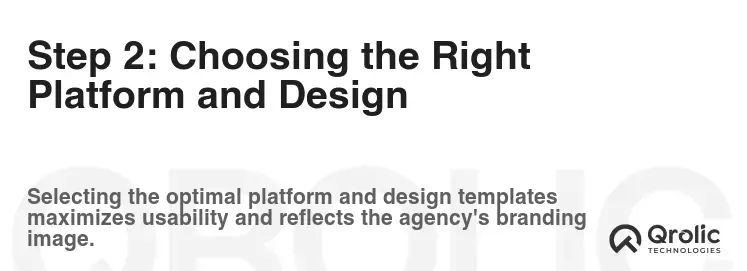
With your plan in place, it’s time to choose the right platform and design for your travel agency website. This is where you bring your vision to life.
Website Builders vs. Content Management Systems (CMS): Which is Right for You?
- Website Builders (e.g., Wix, Squarespace): User-friendly platforms with drag-and-drop interfaces. Ideal for beginners with limited technical skills. Limited customization options.
- Content Management Systems (CMS) (e.g., WordPress, Joomla, Drupal): More powerful and flexible platforms that require some technical knowledge. Offer greater customization and scalability. WordPress is the most popular CMS, powering over 40% of all websites.
Considerations:
- Technical Skills: How comfortable are you with coding and Web Development?
- Budget: Website builders typically offer monthly subscription plans, while CMS platforms require you to pay for hosting and a domain name.
- Customization: How much control do you want over the design and functionality of your website?
- Scalability: How likely are you to need to add new features or functionality to your website in the future?
Recommendation: For most travel agencies, wordpress is the best option. It offers a good balance of ease of use, customization, and scalability.
Selecting a Domain Name and Hosting Provider: Your Digital Address and Home
Your domain name is your website’s address on the internet (e.g., yourtravelagency.com). Choose a domain name that is:
- Easy to remember: Avoid complicated spellings or unusual characters.
- Relevant to your business: Include keywords related to travel or your agency’s name.
- Short and concise: Easier to type and remember.
- Available: Check if the domain name is available before registering it.
Hosting Providers:
A hosting provider stores your website’s files on their servers and makes them accessible to visitors. Choose a reliable hosting provider with:
- Fast loading speeds: Essential for user experience and SEO.
- High uptime: Ensures that your website is always available.
- Good customer support: Helpful in case you encounter any technical issues.
- Scalability: Allows you to increase your resources as your website grows.
- Security: Protects your website from hackers and malware.
Popular Hosting Providers:
- Bluehost: A popular and affordable option, especially for WordPress websites.
- SiteGround: Known for its excellent customer support and fast loading speeds.
- HostGator: A well-established provider with a wide range of hosting plans.
- DreamHost: An independent provider with a strong focus on privacy and security.
Choosing a Travel Agency Website Theme: Design Inspiration
A theme is a pre-designed template that provides the overall look and feel of your website. Choose a theme that is:
- Responsive: Adapts to different screen sizes (desktops, tablets, smartphones).
- Mobile-Friendly: Optimized for mobile devices, as a significant portion of website traffic comes from mobile users.
- Visually Appealing: Uses high-quality images and videos to showcase your destinations and services.
- User-Friendly: Easy to navigate and use.
- SEO-Friendly: Optimized for search engines.
- Customizable: Allows you to change the colors, fonts, and layout to match your brand.
Popular Travel Agency wordpress Themes:
- Travel Agency by AccessPress Themes: A free theme with a clean and modern design.
- Travel Tour by ThemeHunk: A premium theme with advanced features for showcasing tours and packages.
- Adventure Tours by MotoPress: A premium theme designed specifically for adventure travel agencies.
- OceanWP: A versatile theme that can be customized for any type of website, including travel agencies.
- Astra: Another popular and lightweight theme with a wide range of customization options.
Designing for User Experience (UX): Making Your Website a Pleasure to Use
User experience (UX) is the overall feeling that a user has when interacting with your website. A good UX is essential for attracting and retaining clients.
Key UX Principles:
- Simplicity: Keep your website clean and uncluttered. Avoid overwhelming visitors with too much information.
- Navigation: Make it easy for visitors to find what they’re looking for. Use clear and concise navigation menus.
- Visual Hierarchy: Guide visitors’ eyes to the most important elements on the page.
- Mobile-Friendliness: Ensure that your website is fully responsive and mobile-friendly.
- Accessibility: Make your website accessible to people with disabilities.
- Fast Loading Speeds: Optimize your website for speed to prevent visitors from getting frustrated.
- Clear Call to Actions: Tell visitors what you want them to do (e.g., “Book Now,” “Request a Quote,” “Contact Us”).
Visual Elements to Consider:
- Color Palette: Select colors that align with your brand and create a welcoming atmosphere.
- Typography: Choose fonts that are easy to read and visually appealing.
- Imagery: Use high-quality photos and videos of your destinations and services.
- White Space: Use white space to create a clean and uncluttered design.
Step 3: Building Your Travel Agency Website – Content Creation and Functionality
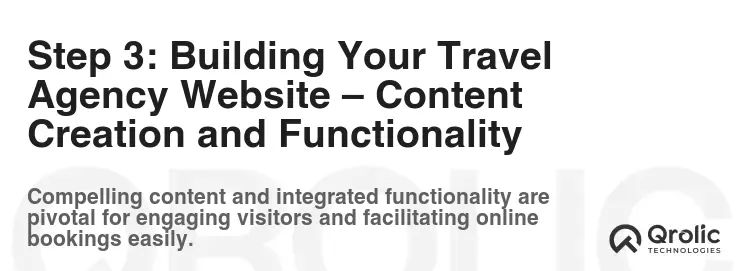
Now, the real work begins! Time to populate your website with engaging content and integrate the necessary functionality to turn visitors into paying customers.
Crafting Compelling Content: Telling Your Travel Story
Your website’s content is your opportunity to showcase your expertise, build trust, and inspire potential clients.
Tips for Writing Effective Content:
- Know Your Audience: Tailor your content to the specific needs and interests of your target audience.
- Write Clearly and Concisely: Use simple language and avoid jargon.
- Focus on Benefits: Highlight the benefits of your services, not just the features.
- Tell Stories: Share personal experiences and client testimonials to create an emotional connection.
- Use Strong Visuals: Enhance your content with high-quality images and videos.
- Proofread Carefully: Ensure that your content is free of errors in grammar and spelling.
- Optimize for SEO: Incorporate relevant keywords into your content.
Content Ideas for Travel Agency Websites:
- Destination Guides: Provide detailed information about the destinations you specialize in, including attractions, activities, and accommodations.
- Travel Tips: Share helpful tips for planning and preparing for travel.
- Packing Lists: Create packing lists for different types of trips.
- Budgeting Tips: Offer advice on how to travel on a budget.
- Safety Tips: Provide information on how to stay safe while traveling.
- Local Customs and Etiquette: Educate travelers about the local customs and etiquette of different destinations.
- Inspiring Travel Stories: Share stories of your own travel experiences or those of your clients.
- Client Testimonials: Feature positive reviews from satisfied clients.
- Blog Posts: Regularly publish new blog posts to keep your website fresh and engaging.
Integrating Booking Engines and Payment Gateways: Making it Easy to Book and Pay
Seamless integration of booking engines and secure payment gateways is crucial for converting website visitors into paying customers.
Booking Engines:
A booking engine allows visitors to search for and book tours, packages, flights, and accommodations directly on your website.
Popular Booking Engines:
- Amadeus: A global distribution system (GDS) that provides access to a wide range of travel products.
- Sabre: Another major GDS with a comprehensive selection of travel inventory.
- Travelport: A GDS that connects travel agencies with airlines, hotels, and car rental companies.
- Rezdy: A booking engine specifically designed for tour operators and activity providers.
- FareHarbor: Another popular booking engine for tours and activities.
Payment Gateways:
A payment gateway securely processes online payments from your clients.
Popular Payment Gateways:
- PayPal: A widely used payment gateway that is easy to integrate with your website.
- Stripe: A powerful and customizable payment gateway that is popular with developers.
- Authorize.net: A secure and reliable payment gateway that is widely used in the travel industry.
- Square: A mobile payment solution that is also suitable for online payments.
Security is Paramount:
When integrating booking engines and payment gateways, security is paramount. Ensure that your website is protected with an SSL certificate and that your payment gateway is PCI compliant.
Adding Essential Plugins and Functionality: Enhancing Your Website’s Capabilities
Plugins are add-ons that extend the functionality of your website.
Essential Plugins for Travel Agency Websites:
- SEO Plugin (e.g., Yoast SEO, Rank Math): Helps you optimize your website for search engines.
- Contact Form Plugin (e.g., Contact Form 7, WPForms): Allows visitors to easily contact you.
- Social Media Sharing Plugin (e.g., Social Warfare, Shareaholic): Makes it easy for visitors to share your content on social media.
- Image Optimization Plugin (e.g., Smush, ShortPixel): Compresses your images to improve website loading speeds.
- Security Plugin (e.g., Wordfence, Sucuri): Protects your website from hackers and malware.
- Caching Plugin (e.g., WP Rocket, LiteSpeed Cache): Caches your website to improve loading speeds.
- Google Analytics Plugin (e.g., MonsterInsights): Tracks your website traffic and provides valuable insights into visitor behavior.
Mobile Optimization: Catering to On-the-Go Travelers
As mentioned earlier, a mobile-friendly website is essential. Ensure that your website is fully responsive and that all elements are easily accessible on mobile devices.
Tips for Mobile Optimization:
- Use a Responsive Theme: Choose a theme that automatically adapts to different screen sizes.
- Optimize Images: Compress your images to reduce file sizes and improve loading speeds.
- Use Mobile-Friendly Navigation: Make it easy for visitors to navigate your website on mobile devices.
- Use Large Buttons and Links: Make it easy for visitors to tap on buttons and links on mobile devices.
- Avoid Flash: Flash is not supported on most mobile devices.
- Test Your Website on Different Devices: Ensure that your website looks and functions correctly on a variety of mobile devices.
Ready to Build Your Next Project?
Let’s turn your ideas into a powerful digital solution. Contact us today to get started with expert web development and design services.
Step 4: Optimizing Your Travel Agency Website for Search Engines (SEO)
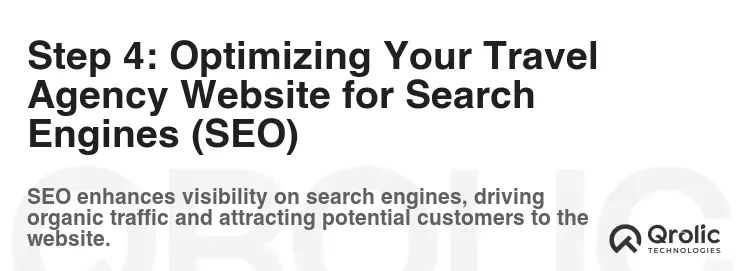
Creating a beautiful website is only half the battle. You need to make sure that potential clients can actually find your website when they search for travel information online. That’s where search engine optimization (SEO) comes in.
On-Page SEO: Optimizing Your Website’s Content and Structure
On-page SEO involves optimizing the elements within your website to improve its ranking in search engine results pages (SERPs).
Key On-Page SEO Factors:
- Keyword Research: Identify the keywords that your target audience uses when searching for travel information online.
- Title Tags: Write compelling title tags that include your target keywords.
- Meta Descriptions: Write informative meta descriptions that accurately describe the content of your pages.
- Headings: Use headings (H1, H2, H3, etc.) to structure your content and include relevant keywords.
- Body Text: Naturally incorporate keywords into your body text.
- Image Alt Text: Describe your images using relevant keywords.
- Internal Linking: Link to other relevant pages on your website.
- URL Structure: Create search engine friendly URLs.
- Mobile-Friendliness: Ensure that your website is fully responsive and mobile-friendly.
- Page Speed: Optimize your website for speed.
- User Experience (UX): Create a user-friendly website that is easy to navigate.
Off-Page SEO: Building Authority and Backlinks
Off-page SEO involves activities that you do outside of your website to improve its ranking in search engine results pages (SERPs).
Key Off-Page SEO Factors:
- Link Building: Acquire backlinks from other reputable websites in the travel industry.
- Social Media Marketing: Promote your website and content on social media platforms.
- Online Directory Listings: List your website in online directories such as Yelp and Google My Business.
- Guest Blogging: Write guest posts for other travel blogs and websites.
- Brand Mentions: Monitor online mentions of your brand and engage with your audience.
- Reputation Management: Monitor your online reviews and respond to feedback.
Local SEO: Attracting Local Clients
If you serve a local market, local SEO is crucial for attracting clients in your area.
Key Local SEO Factors:
- Google My Business: Create and optimize your Google My Business listing.
- Local Citations: List your business in local directories.
- Online Reviews: Encourage clients to leave reviews on Google and other review sites.
- Local Keywords: Use local keywords in your website content and meta descriptions.
- NAP Consistency: Ensure that your name, address, and phone number (NAP) are consistent across all online platforms.
Tracking Your SEO Progress: Measuring Your Success
It’s essential to track your SEO progress to see what’s working and what’s not.
Tools for Tracking SEO Progress:
- Google Analytics: Tracks your website traffic and provides valuable insights into visitor behavior.
- Google Search Console: Provides information about your website’s performance in Google search results.
- SEMrush: A comprehensive SEO tool that offers a wide range of features, including keyword tracking, competitor analysis, and site auditing.
- Ahrefs: Another popular SEO tool with powerful tracking capabilities.
- Moz Pro: A user-friendly SEO tool with a focus on keyword tracking and rank monitoring.
Key Metrics to Track:
- Organic Traffic: The amount of traffic that comes to your website from search engines.
- Keyword Rankings: The position of your website in search engine results pages for your target keywords.
- Bounce Rate: The percentage of visitors who leave your website after viewing only one page.
- Conversion Rate: The percentage of visitors who complete a desired action, such as booking a tour or requesting a quote.
- Domain Authority: A measure of the overall authority of your website.
Step 5: Launching and Maintaining Your Travel Agency Website
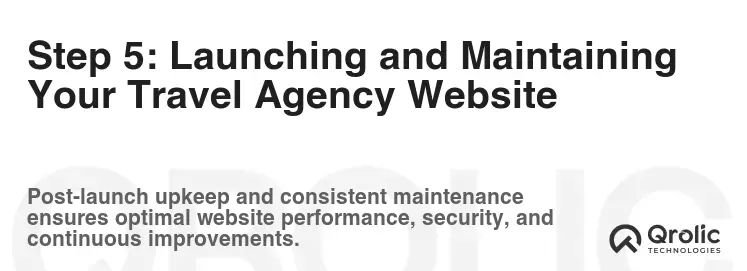
Congratulations! You’ve built your travel agency website. Now it’s time to launch it and ensure that it continues to perform well over time.
Testing Your Website: Ensuring Everything Works Flawlessly
Before launching your website, thoroughly test it to ensure that everything works as expected.
Things to Test:
- Functionality: Test all forms, links, and buttons to ensure that they are working correctly.
- Responsiveness: Test your website on different devices and screen sizes.
- Cross-Browser Compatibility: Test your website in different web browsers (e.g., Chrome, Firefox, Safari, Edge).
- Page Speed: Check your website’s loading speeds.
- Grammar and Spelling: Proofread all content for errors.
- Security: Ensure that your website is protected with an SSL certificate and that your payment gateway is PCI compliant.
Promoting Your Website: Getting the Word Out
Once your website is launched, promote it to attract visitors.
Promotion Strategies:
- Social Media Marketing: Share your website and content on social media platforms.
- Email Marketing: Send email newsletters to your subscribers.
- Online Advertising: Run online ads on Google and social media platforms.
- Content Marketing: Create valuable content that attracts and engages your target audience.
- Public Relations: Reach out to journalists and bloggers to get media coverage.
- Partnerships: Partner with other businesses in the travel industry.
- Search Engine Optimization (SEO): Optimize your website for search engines.
Regularly Updating Your Website: Keeping it Fresh and Relevant
To keep your website fresh and relevant, regularly update its content and functionality.
Things to Update:
- Blog Posts: Publish new blog posts on a regular basis.
- Destination Guides: Update your destination guides with new information.
- Testimonials: Add new client testimonials.
- Plugins: Update your plugins to the latest versions.
- Theme: Update your theme to the latest version.
- Security: Keep your website secure by implementing the latest security measures.
Monitoring Your Website’s Performance: Identifying Areas for Improvement
Regularly monitor your website’s performance to identify areas for improvement.
Key Metrics to Monitor:
- Website Traffic: The number of visitors to your website.
- Bounce Rate: The percentage of visitors who leave your website after viewing only one page.
- Conversion Rate: The percentage of visitors who complete a desired action.
- Keyword Rankings: The position of your website in search engine results pages for your target keywords.
- User Feedback: Collect feedback from your website visitors.
By monitoring these metrics, you can identify areas where your website is performing well and areas where it needs improvement.
Qrolic Technologies: Your Partner in Travel Website Development

Creating a successful travel agency website requires expertise in web design, development, and digital marketing. At Qrolic Technologies (https://qrolic.com/), we understand the unique needs of the travel industry and offer comprehensive solutions to help you achieve your online goals.
Why Choose Qrolic Technologies?
- Industry Expertise: We have extensive experience working with travel agencies of all sizes.
- Custom Solutions: We tailor our solutions to meet your specific needs and budget.
- Cutting-Edge Technology: We use the latest technologies to create innovative and effective websites.
- SEO Expertise: We optimize your website for search engines to attract more organic traffic.
- Ongoing Support: We provide ongoing support and maintenance to ensure that your website is always performing at its best.
Our Services:
- Travel Website Design and Development: We create visually appealing and user-friendly websites that are optimized for conversions.
- Booking Engine Integration: We integrate booking engines to enable online booking for tours, packages, flights, and accommodations.
- Payment Gateway Integration: We integrate secure payment gateways to process online payments.
- SEO Services: We optimize your website for search engines to attract more organic traffic.
- Social Media Marketing: We help you promote your website and content on social media platforms.
- Content Marketing: We create valuable content that attracts and engages your target audience.
Let Qrolic Technologies help you create a travel agency website that drives results! Contact us today for a free consultation.
Final Thoughts: The Journey Never Ends

Creating a successful travel agency website is not a one-time project – it’s an ongoing journey. By following the steps outlined in this guide and staying up-to-date with the latest trends, you can create a website that attracts new clients, showcases your expertise, and helps you achieve your business goals. Remember to be patient, persistent, and always focus on providing a great user experience. The world of travel is vast and exciting, and your website is your portal to sharing that with the world. Good luck!
